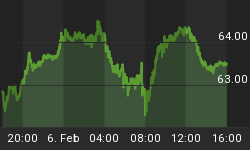Last week I ran into a friend whom I'd been worrying about. He's a real estate appraiser and his work had been drying up as interest rates rose and homeowners stopped refinancing their mortgages.
But now he's back to being happily swamped because instead of refinancing, everyone is buying -- often, he says, for above the asking price.
A couple of days later my wife and I were at a slide show put on by friends just back from New Zealand. They'd heard that a neighbor was thinking about selling his house and on an impulse made him an offer. He accepted, and our friends became instant homeowners.
The very next day my wife's father called to say that the company running a gas station next to his house wants to expand in his direction. They made him an unsolicited – and very generous -- offer, which he accepted.
Then, I did an interview with Gordon T. Long's Macro Analytics website in which Gordon told the following story:
My brother just sold one of his properties in Toronto [Ontario]. He had bidding war with 11 bidders so he demanded cash. Several of the Chinese buyers were on the phone overnight raising the money, which they got. My brother's still partying after that sale.
It definitely feels like the housing bubble is back. Here's part of a (factual rather than anecdotal) overview of the subject from Charles Hugh Smith:
Housing's Echo Bubble Now Exceeds the 2006-07 Bubble Peak
If you need some evidence that the echo-bubble in housing is global, take a look at this chart of Sweden's housing bubble
A funny thing often occurs after a mania-fueled asset bubble pops: an echo-bubble inflates a few years later, as monetary authorities and all the institutions that depend on rising asset valuations go all-in to reflate the crushed asset class.
Take a quick look at the Case-Shiller Home Price Index charts for San Francisco, Seattle and Portland, OR. Each now exceeds its previous Housing Bubble #1 peak:
Is an asset bubble merely in the eye of the beholder? This is what the multitudes of monetary authorities (central banks, realty industry analysts, etc.) are claiming: there's no bubble here, just a "normal market" in action.
This self-serving justification–a bubble isn't a bubble because we need soaring asset prices–ignores the tell-tale characteristics of bubbles. Even a cursory glance at these charts reveals various characteristics of bubbles: a steep, sustained lift-off, a defined peak, a sharp decline that retraces much or all of the bubble's rise, and a symmetrical duration of the time needed to inflate and deflate the bubble extremes.
It seems housing bubbles take about 5 to 6 years to reach their bubble peaks, and about half that time to retrace much or all of the gains.
Bubbles have a habit of overshooting on the downside when they finally burst. The Federal Reserve acted quickly in 2009-10 to re-inflate the housing bubble by lowering interest rates to near-zero and buying over $1 trillion of mortgage-backed securities.
When bubbles are followed by echo-bubbles, the bursting of the second bubble tends to signal the end of the speculative cycle in that asset class. There is no fundamental reason why housing could not round-trip to levels below the 2011 post-bubble #1 trough.
If you need some evidence that the echo-bubble in housing is global, take a look at this chart of Sweden's housing bubble. Oops, did I say bubble? I meant "normal market in action."
Who is prepared for the inevitable bursting of the echo bubble in housing? Certainly not those who cling to the fantasy that there is no bubble in housing.
Dozens of other stats and charts are out there to support this assertion. With one big departure from 2007: This time around housing is just part of a constellation of bubbles that includes government bonds around the world, equities (the Nasdaq just hit 6000) and all manner of trophy assets like fine art.
Predicting the imminent end of this mother of all financial manias is tiresome for both writers and readers, so let's just assume it will end eventually, and that its demise will be spectacular.



















